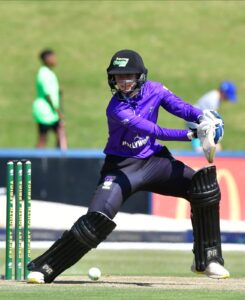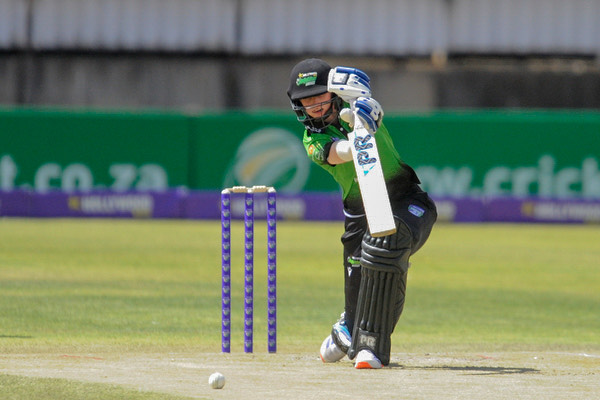Alexandra Candler, a professional cricketer for the Dolphins and a current BSc in Strength and Conditioning student, shares her journey to professional cricket, the impact of S&C and her hopes for the future of women’s cricket.
Journey to Professional Cricket
“I started playing sport at a very young age. I played tennis, hockey, soccer and only later started to play cricket. my cricket journey started by chance, when the boys 1st team coach asked me to bowl to the boys at a net practice. The following weekend i was in the boys 2nd team and the weekend after that i was in the 1st team.” Alexandra shares. “I am now a contracted provincial cricket player which means that on a daily basis I am practicing and training with my team and individually. Being fit and healthy is very important for me generally and because it helps me to be the best I can be as a professional sportswoman.”
“It was only when i entered the professional set up at the Dolphins as a non-contracted player in my first year that I realised that in addition to having to work hard on my skills, I also had to work hard on my strength and conditioning. Now, it is natural for me to put equal amounts of effort and time into developing my game and training.”
A Typical Training Day
Alexandra typically begins her days with an early morning net session followed by a gym session. “In the afternoon we work on fielding drills and then we go through a cool down and stretching routine. On some days we do a centre wicket practice and at regular intervals during the season we do a fitness testing session,” she shared.
Despite the demands of her cricket career, Alexandra makes sure to maintain the balance between her playing career and other aspects of her life. “When I’m not training or practising, I enjoy going for coffee with friends, going to the mall, and walking along the promenade,” she said.
Breaking Barriers
Alexandra was the first girl in her school’s history to captain the boys’ 1st XI cricket team, an opportunity that brought some challenges. “Being the first girl to captain the boys’ first eleven at my school was both a privilege and a challenge. Being a girl in an all-boys team had unique challenges as I was often seen by opposing teams as the weak link and being captain also raised many eyebrows in opposing teams,” she shared.
 However, Alexandra was supported by her teammates and coach who she described as “very supportive and even protective” over her. “The support of my coach and the boys in the team made the job a lot easier for me,” she said. “Playing in the boys team helped me to develop a mental toughness and leading the team helped me to stay humble and grounded.”
However, Alexandra was supported by her teammates and coach who she described as “very supportive and even protective” over her. “The support of my coach and the boys in the team made the job a lot easier for me,” she said. “Playing in the boys team helped me to develop a mental toughness and leading the team helped me to stay humble and grounded.”
Alexandra also represented South Africa at U19 level. “Playing that level made me realise that I was capable of playing cricket at a high level. It also made me realise that I needed to work hard in order to improve my game,” she recalled.
The Impact of Strength and Conditioning
Strength and conditioning has played an important role in Alexandra’s playing career. “In my own experience it has helped me to perform better in back-to-back games, reduce injury risk, bowl faster and more accurately, bat for long periods involving high levels of concentration and hit the ball with more power and control,” she noted. Driven by this, Alexandra decided to pursue a BSc in Strength and Conditioning.
Her decision to study strength and conditioning has had a positive impact on not only her career but her teammates too. “Studying what I am interested in is exciting and extremely helpful in my capacity as a professional athlete. Not only have I gained knowledge of the practical components of strength and conditioning, but also the theory behind the practical elements. Before I started studying my approach to the physical preparation for cricket was largely unstructured and a hit-and-miss approach, now I am able to structure most facets of my preparation to facilitate optimum performance and recovery.”
Preparing for a Post-Playing Career
“In the long run having a qualification like the BSc in Strength and Conditioning will assist with me being able to continue in the realm of professional sport once my playing days are over,” she explained.
Alexandra plans to utilise her experience in her professional career along with her qualifications to stay involved in professional cricket in a different capacity once she retires from playing. “In addition to my degree course, I have begun to become accredited as a cricket coach. The combination of my experience as a player and the formal qualifications in strength and conditioning and coaching should stand me in good stead for a career within professional cricket structures once my playing days are over,” she shared.
The Future of Women’s Cricket
Alexandra is excited about the future of women’s cricket and believes that progress is being made in growing the sport with the introduction of professional contracts for women having a positive knock-on effect right down to grassroots level. “In South Africa, one of the biggest moves towards progress in women’s cricket has been the introduction of professional contracts which allow contracted players to concentrate solely on playing cricket. This in turn means that the standard of women’s cricket has improved which attracts more sponsorship for the game and this creates opportunities for greater media coverage,” she explained. “As a result, the public are able to watch high-level women’s cricket either live or on TV and this creates more interest at grassroots level and so talented pipelines are established for sustained development of the game.”


Leave A Comment